
by Editor | Jan 7, 2021 | News
A PDF of the Report can be found here.
BOSTON, January 7, 2021: Leaders from Australia, India, Japan, and the United States have proposed a blueprint for tackling the major challenges confronting the incoming Biden administration and other world leaders in a post-Trump era. The proposals were developed by the Quadrilateral Initiative, which was started by Japanese Prime Minister Shinzo Abe to review and address global issue.
The four countries, known informally as the Quad, address shared goals within a framework of cooperation, diplomacy, and democratic values. Senior officials from the countries met in mid-November on the sidelines of the Riga Conference 2020, which drew the president and vice president of the European Commission, the secretary general of NATO, the presidents of the Baltic countries and defense ministers from the Canada, France, Japan and the United Kingdom as well as the Baltic nations.
The Quad session was organized by the Latvian Transatlantic Organization and the Boston Global Forum. Speakers included former Massachusetts Governor Michael Dukakis, chairman of the Boston Global Forum; Defense State Minister Yasuhide Nakayama of Japan; Senator Kimberly Kitching, chair of the Australian Senate Foreign Affairs, Defense and Trade References Committee; and Ambassador P.S. Raghavan, chairman of India’s National Security Advisory Board.
The special report prepared by the Quad identified five challenges confronting the global community as a new administration takes over in Washington and global leaders work to mend differences among Western allies and shape the new arena for competition and cooperation in fields like artificial intelligence and cybersecurity. The main challenges in the report are:
- The interests of the United States should be realigned with its Western allies to open the door for peace, stability, and long-term prosperity. Cooperation should be renewed on global issues like climate change and humanitarian assistance.
- The objective of the Quad is to promote openness, transparency, and inclusion across the Indo-Pacific region. The foundation for this objective rests on broadening cooperation and improving adherence to the rule of law among the many nations of the region.
- The enormous potential of artificial intelligence should be harnessed for the benefit of every nation and every person, rather than restricted to a handful of countries and tech titans. The promotion of inclusion and democracy through AI should be encouraged and attempts to use AI to support authoritarian regimes should be blocked. The Quad concluded that supporting standards and democratic values reflected in the Social Contract for the AI Age is essential to countering threats from AI and enhancing its common good.
- The Quad and its allies should enable China to recognize the global responsibilities that accompany its position as an AI and economic powerhouse. Rather than confronting China, the Western alliance should exercise its responsibility to ensure that China respects its neighbors and the democratic imperative for Hong Kong.
- The surge of 5G technologies will expand the impact of artificial intelligence in ways that could either improve global cooperation or devolve into unhealthy competition. Democratic values should guide the use of AI and big data for the common good rather than the good of the few.
Along with its work in the Indo-Pacific region, the Quad proposes creating an agreement like the Helsinki Accord to meet the challenges and capture the full benefits of artificial intelligence. The new accord could be drafted in Riga and take advantage of cyber and communications expertise of the Baltic countries.
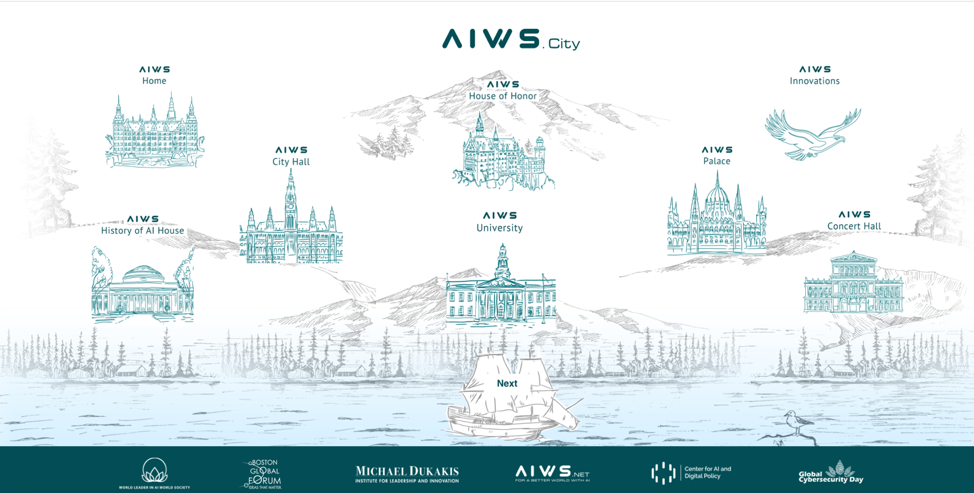
by Editor | Jan 3, 2021 | News
On December 31, 2020, the AI World Society announced the History of AI 2020 Awards. The HAI Awards recognize people and achievements in the AI world that are pioneering, meaningful, and influential.
The History of AI 2020 Awards will be featured at the AI World Society City. The AI World Society (AIWS) City, established in collaboration with the World Leadership Alliance – Club de Madrid, and the United Nations Academic Impact, is a virtual digital city dedicated to the principle of the Social Contract for the AI Age.
On January 9, 2021, AI World Society will officially launch the frontpage of AIWS City at AIWS.city.

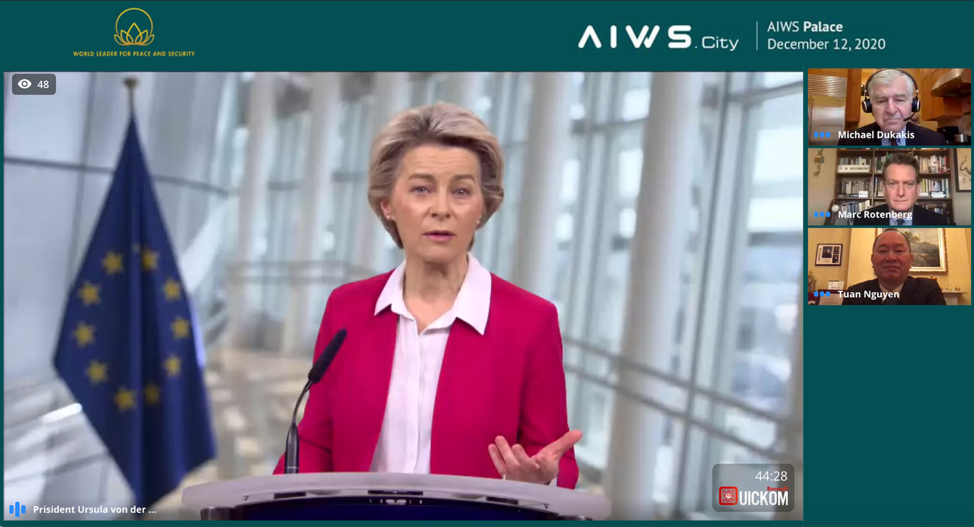
by Editor | Dec 31, 2020 | News
RELEASE: December 31, 2020
1200 EST / 1800 CET
AI World Society Announces
History of AI 2020 Awards
BOSTON – The AI World Society today announced the History of AI 2020 Awards. The HAI Awards recognize people and achievements in the AI world that are pioneering, meaningful, and influential.
The History of AI 2020 Awards for Achievement go to:
AlphaFold – the solution to a 50-year-old grand challenge in biology, developed by DeepMind. “This breakthrough demonstrates the impact AI can have on scientific discovery and its potential to dramatically accelerate progress in some of the most fundamental fields that explain and shape our world.”
“Artificial Intelligence and Democratic Values” – the first comparative study of AI policies and practices sets out a methodology to promote AI that is trustworthy and human-centric. Professor Mireille Hildebrandt called the report “a trove of materials to enable mutual learning strategies.” Gabriela Zanfir-Fortuna said the report is a “vital resource for global policymakers . . . comprehensive and incredibly valuable.”
Deep Understanding – a concept pioneered by Professor Judea Pearl for the development of AI systems that could minimize the creation of large data sets. Deep understanding challenges the common view that meaningful AI requires intensive data collection.
GPT-3 – a natural language program that produces news articles and technical manuals, creative essays, and computer code often difficult to distinguish from human output. GPT-3 also raises challenging ethical questions about machine-generated text.
Social Contract for the AI Age – a framework for a new social contract to ensure peace, security, and democracy in the modern era. The World Leadership Alliance-Club de Madrid, the largest association of former Presidents and Prime Ministers of democratic governments, have endorsed the Social Contract.
The History of AI 2020 Awards to Individuals go to:
President Ursula von der Leyen – The incoming President of the European Commission, von der Leyen has led efforts to establish a regulatory framework for AI, opposed black box algorithms, and called for a Transatlantic Agreement on Artificial Intelligence, based on democratic values, including “human rights, pluralism, inclusion, and the protection of privacy.”
Joy Boulawamini – a Ghanaian-American computer scientist and digital activist based at the MIT Media Lab, Buolawamini founded the Algorithmic Justice League to challenge bias in AI systems. In 2020, her research helped persuade Amazon, IBM, and Microsoft to suspend facial recognition technology, one the most controversial applications of AI.
The History of AI 2020 Awards will be featured at the AI World Society City. The AI World Society (AIWS) City, established in collaboration with the World Leadership Alliance – Club de Madrid, and the United Nations Academic Impact, is a virtual digital city dedicated to the principle of the Social Contract for the AI Age.
CONTACT
Nguyen Anh Tuan, Co-Founder, AI World Society: [email protected]
Press Secretary Dick Pirozzolo: [email protected] / +1 617 959 4613
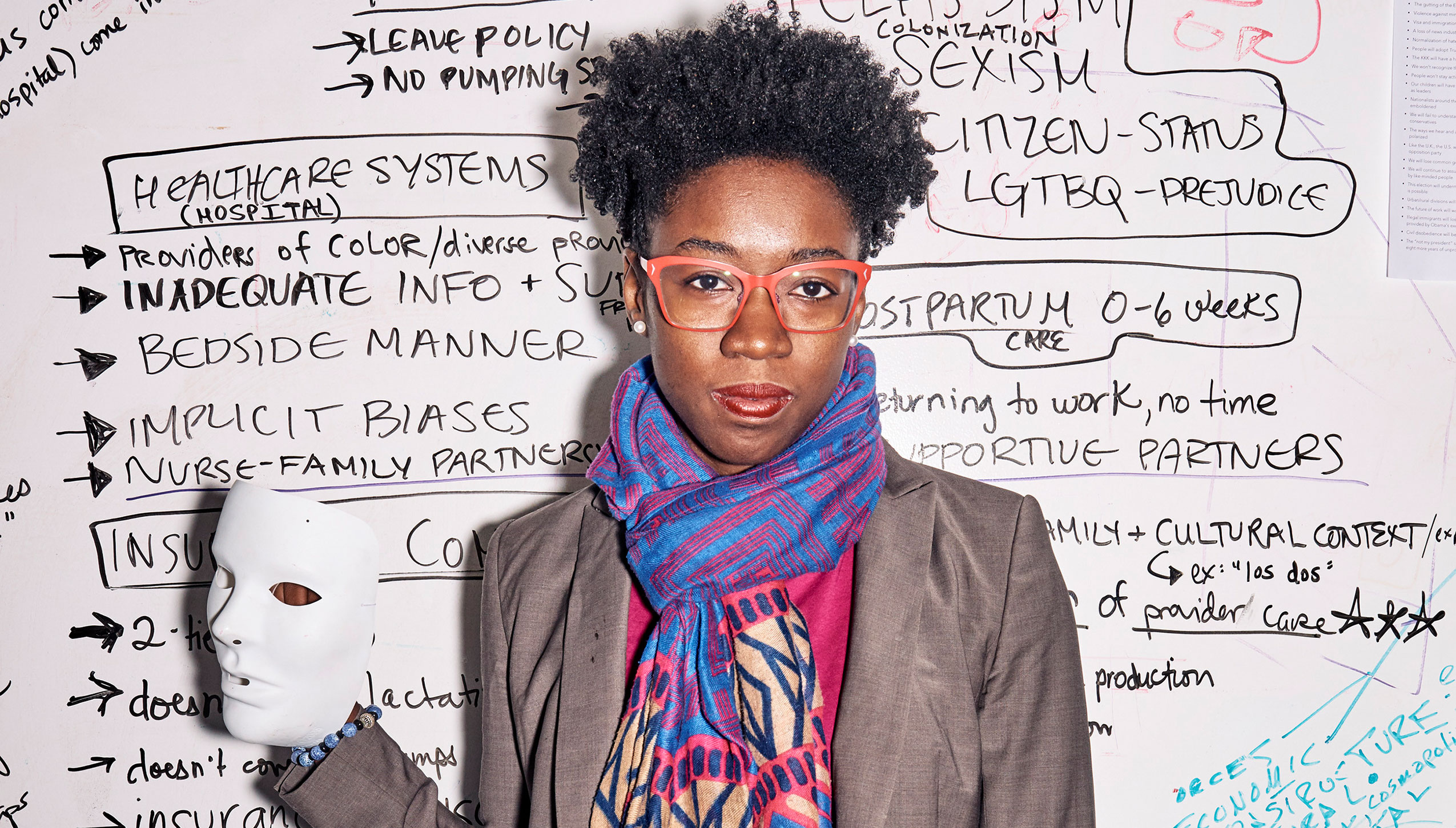
by Editor | Dec 30, 2020 | News
NOMINATION
History of AI 2020
Joy Buolamwini
Joy Adowaa Buolamwini is a Ghanaian-American computer scientist and digital activist based at the MIT Media Lab. She founded the Algorithmic Justice League, an organisation that looks to challenge bias in decision making software.
In 2020, Buolamwini was on the front lines of campaigns in the United States and around the world to stop bias in AI systems. Her research helped persuade Amazon, IBM, and Microsoft to put a hold on facial recognition technology. Her 2020 TED Talk on algorithmic bias has over 1 million views. She was featured in the documentary film Coded Bias that premiered at
the 2020 Sundance Film Festival, that explores how algorithms encode and propagate bias.
Joy Buolamwini has testified before Congress about the dangers of facial recognition and she has called for a complete ban of police use of face surveillance. Her MIT thesis uncovered large racial and gender bias in AI services. Her research has been covered in over 40 countries, and as a renowned international speaker she has championed the need for algorithmic justice at the World Economic Forum and the United Nations. She serves on the Global Tech Panel convened by the vice president of European Commission to advise world leaders and technology executives on ways to reduce the harms of A.I.
As a creative science communicator, she has written op-eds on the impact of artificial intelligence for publications such as TIME Magazine and New York Times. Her spoken word visual audit “AI, Ain’t I A Woman?” shows AI failures on the faces of iconic women like Oprah Winfrey, Michelle Obama, and Serena Williams as well as the Coded Gaze short have been part of exhibitions ranging from the Museum of Fine Arts, Boston to the Barbican Centre, UK.
A Rhodes Scholar and Fulbright Fellow, she holds two masters degrees from Oxford University and MIT; and a bachelor’s degree in Computer Science from the Georgia Institute of Technology. Fortune Magazine named her to their 2019 list of world’s greatest leaders describing her as “the conscience of the A.I. Revolution.”
A brilliant researcher, a highly effective advocate, a creative communicator, Joy Boulamwini should be recognized for HAI 2020.
Marc Rotenberg
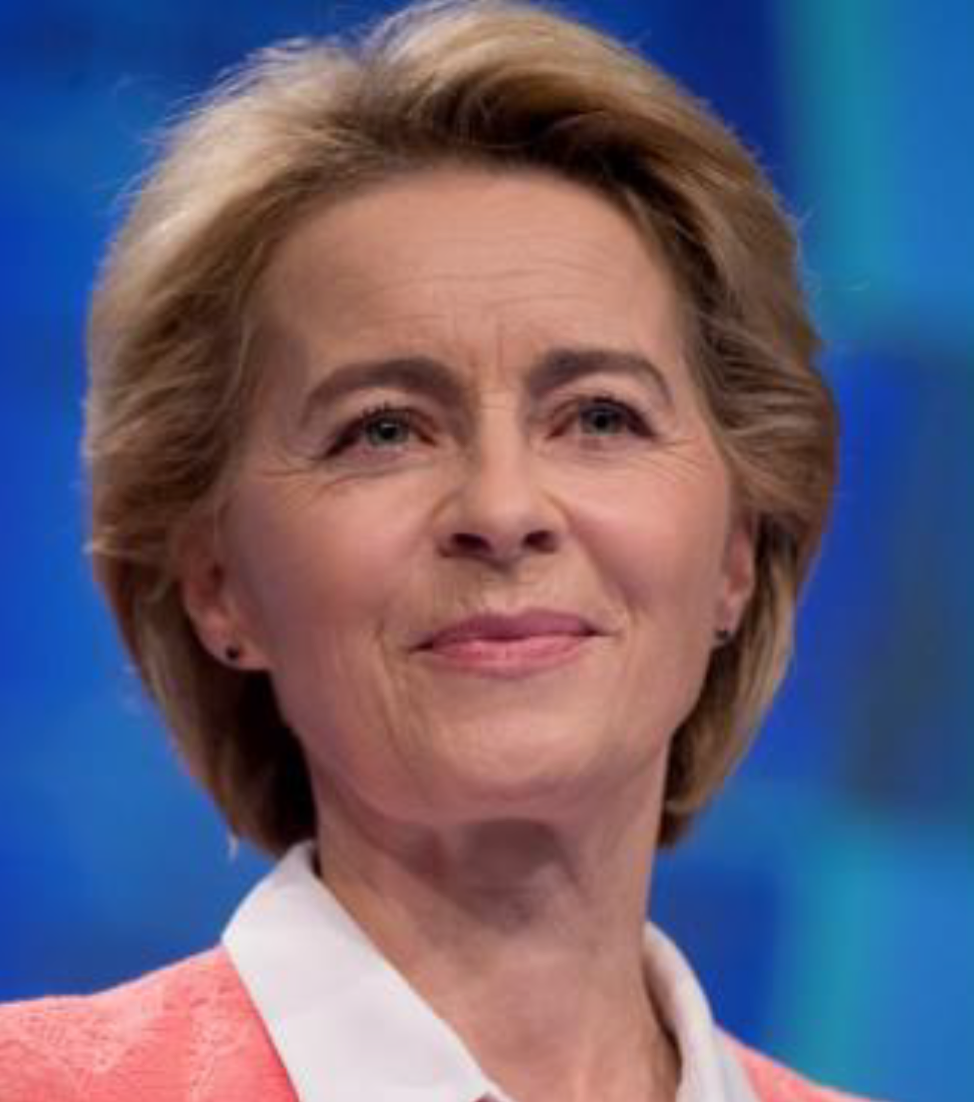
by Editor | Dec 30, 2020 | News
NOMINATION
History of AI 2020
President Ursula von der Leyen
Trained as a physician, Ursula von der Leyen entered politics as a cabinet minister in the German state of Lower Saxony. When Angela Merkel became German chancellor in 2005, she appointed Dr. von der Leyen as Minister of Family Affairs and Youth, a portfolio that aligned with her work on women’s health.
After four years in that position, she was appointed Minister of Labor and Social Affairs. She was then appointed Minister of Defense, the first woman to hold that top post. Von der Leyen also had the distinction of being the longest serving minister of the Merkel government.
As incoming President of the European Commission, in December 2019 von der Leyen called for new rules for AI that respect human rights and public safety. At the 2019 G-20 Summit in Japan, Chancellor Angela Merkel earlier proposed “It will be the job of the next Commission to deliver something so that we have regulation similar to the General Data Protection Regulation that makes it clear that artificial intelligence serves humanity.”
In February 2020, President von der Leyen set out a White Paper on AI for public consultation. In the September 2020 State of the Union Address, she prioritized AI policy for the European Union. She said, “Whether it’s precision farming in agriculture, more accurate medical diagnosis or safe autonomous driving – artificial intelligence will open up new worlds for us.” Von der Leyen continued, “But this world also needs rules. We want a set of rules that puts people at the centre. Algorithms must not be a black box and there must be clear rules if something goes wrong. The Commission will propose a law to this effect next year. This includes control over our personal data which still have far too rarely today.”
And speaking to the Boston Global Forum on December 12, 2020, President von der Leyen called for a Transatlantic Agreement on AI, based on democratic values, including “human rights, pluralism, inclusion, and the protection of privacy.” For her pioneering leadership, she received the 2020 World Leader for Peace and Security Award.
President von der Leyen is also a tireless advocate for a more united Europe, a Europe that would assume a larger role in international diplomacy and security. A champion of democratic rights and institutions, she has contested the emergence of right-wing nationalism and state authoritarianism. She has pressed European countries to act collectively against COVID-19. She is committed to the Transatlantic Alliance, recognizing the collective responsibility of the EU and the US to advance global peace, security, and development.
A champion of democratic values, a trained scientist who places humanity at the center of AI innovation, President von der Leyen should be recognized for HAI 2020
Marc Rotenberg
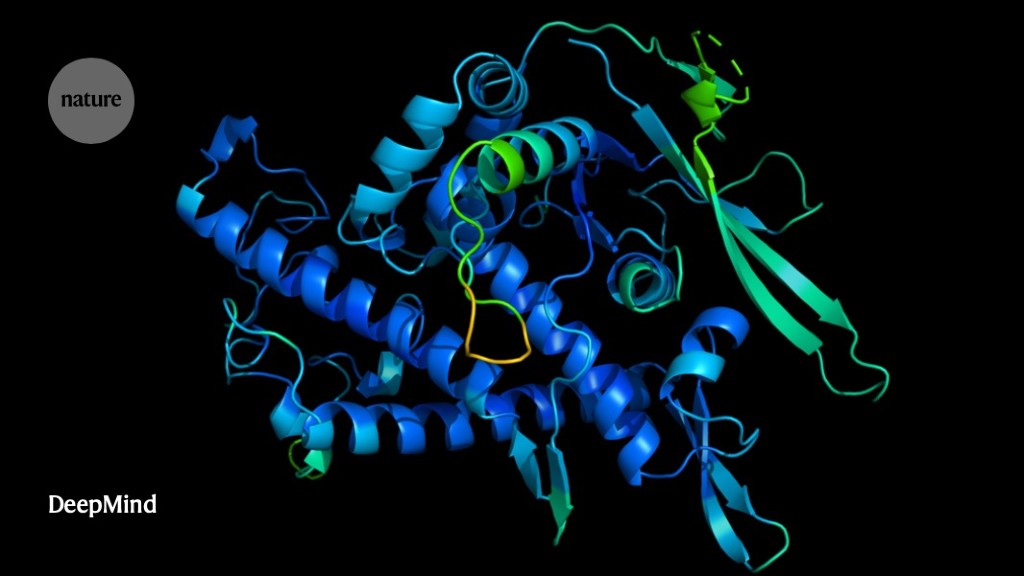
by Editor | Dec 30, 2020 | News
Towards the end of 2020, Google DeepMind announced that they developed an AI network (AlphaFold) that determines a protein’s 3D shape from its amino-acid sequence.
The ability to accurately predict protein structures from their amino-acid sequence would vastly accelerate efforts to understand the building blocks of cells and enable quicker and more advanced drug discovery. AlphaFold has been recognised as a solution to this grand challenge by the organisers of the biennial Critical Assessment of protein Structure Prediction (CASP).
CASP was founded in 1994 by Professor John Moult and Professor Krzysztof Fidelis as a biennial blind assessment to catalyse research, monitor progress, and establish the state of the art in protein structure prediction. It is considered the gold standard for assessing predictive techniques. After DeepMind’s revelation of its model and accuracy rate this year, Moult stated “In some sense the problem is solved.”
Professor Venki Ramakrishnan, the winner of the 2009 Nobel Prize for Chemistry said “this computational work represents a stunning advance on the protein-folding problem, a 50-year-old grand challenge in biology. It has occurred decades before many people in the field would have predicted.”
Merve Hickok
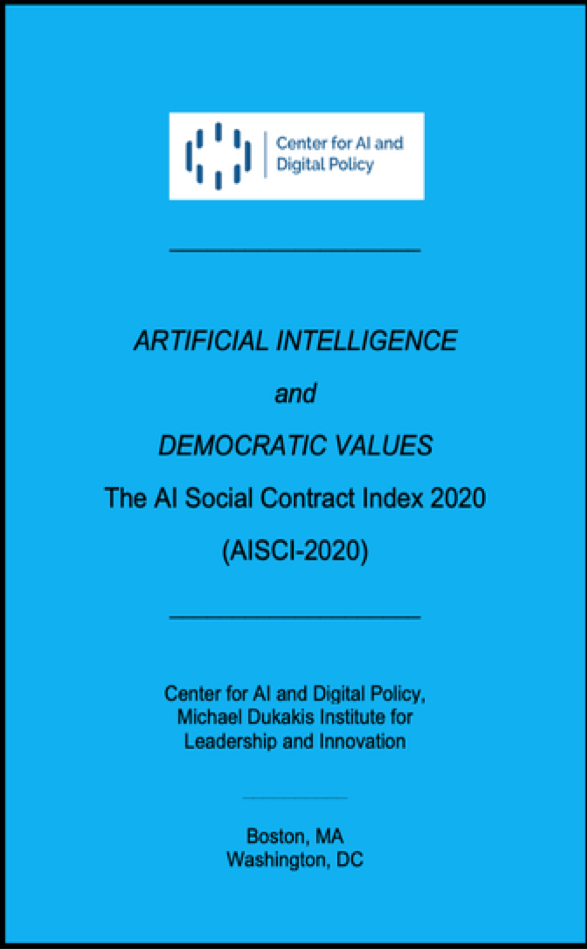
by Editor | Dec 30, 2020 | News
NOMINATION
History of AI 2020
In the last days of 2020 Artificial Intelligence and Democratic Values: AISCI-2020 report was published. The report was prepared by the Center for AI and Digital Policy at the Michael Dukakis Institute and conducted by a team of international experts.
The report is first of its kind as a comparative review of national AI policies. 30 countries were reviewed in terms of their endorsement and implementation of OECD AI Principles within their national AI strategies and public implementations. It will serve as the baseline for future work and as one scholar (Mireille Hildebrandt) called it is “a trove of materials to enable mutual learning strategies instead of reinventing the wheel.”
The report also amplifies the AI Social Contract Index and CAIDP’s mission –“to promote a better society, more fair, more just —a world where technology promotes broad social inclusion based on fundamental rights, democratic institutions, and the rule of law.” It will pushes the boundaries and expectations from governments, and seeks seeks to build a multi-stakeholder, inclusive society in all aspects of life across politics, government, economics, business, and industry.
The methodology developed for the report draws on the work of international human rights organizations and data protection experts, and provides a clear ranking for each country. The AI Index 2020 encourages all countries to make real the promise of AI that is trustworthy, human-centric, and provides broad social benefit to all.
Merve Hickok
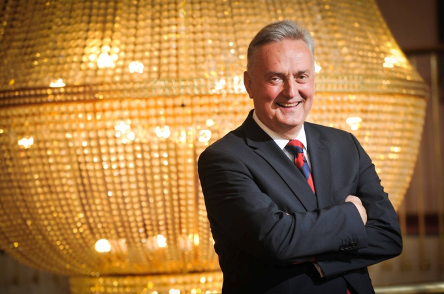
by Editor | Dec 30, 2020 | News
30.12.2020. Zlatko Lagumdzija
The History of AI event of 2020 – The Social Contract for the AI Age
Zlatko Lagumdzija
Former Prime Minister of Bosnia and Herzegovina
Member of World Leadership Alliance-Club de Madrid
Member of the History of AI Board
Social Contract for the AI Age can be named as the History of AI event of 2020 since it is offering transformative tools and means for creating complex elements and goals of great mosaic reflecting different perspectives in search for our prosperous and shared future.
Development of AI that is impacting our life and work with magnitudes bigger than any human invention in history is a clear sign of necessity and importance of a pioneering act such as the first Social Contract in the Internet and AI Age.
Fruits of Renaissance and Age of Enlightenment have been enjoyed by people because of great thinkers like Thomas Hobbes and Jean Jacques Rousseau who created the Social Contract concept as the leading doctrine of political legitimacy and platform for peace, security and democracy centuries ago.
Social Contract for the AI Age, as agreement among all stakeholders of society to work together for social benefit, is a comprehensive and impactful call to leaders to show wisdom and leadership using science and technology fruits in order to move our planet in the right direction.
Since September creation and adoption by 10 signatories coming from different backgrounds and experiences, under umbrella of the Boston Global Forum and AI World Society (AIWS), it has been endorsed, supported and called for implementation by the World Leadership Alliance – Club de Madrid and a long line of stakeholders from governments, academic, civil society and business leaders from various parts of the globe.
Social Contract for the AI Age is a pioneering, meaningful and impactful document since it is defining the purpose, vision and values that can be met by tools and means like AI is offering.
That is why Social Contract for the AI Age can help us to shape societies for a common purpose through transformative vision that transcends the technological features of AI and seeks to provide foundations for a progressive, new, better, and more prosperous society.
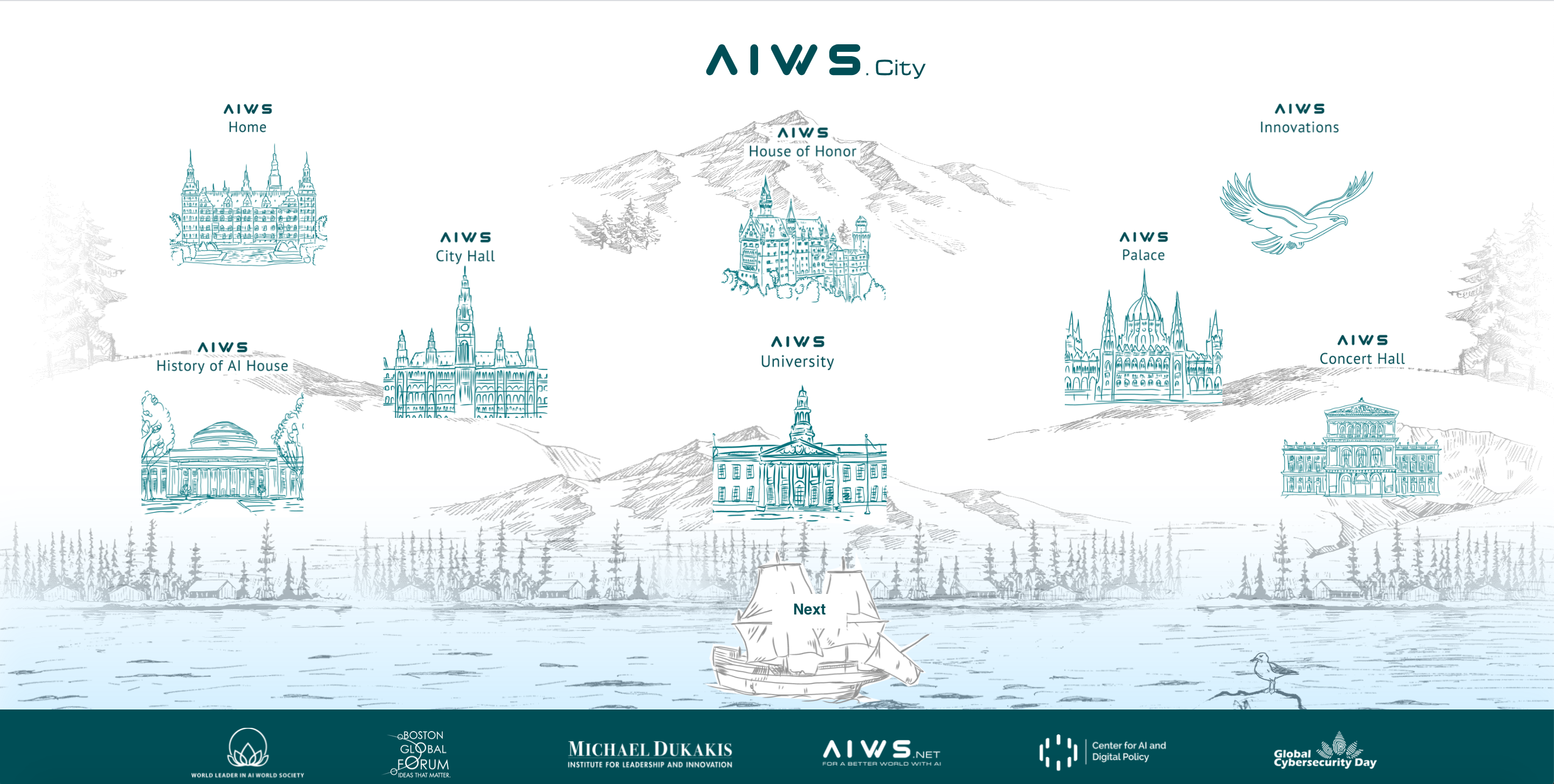
by Editor | Dec 28, 2020 | News
On December 24, 2020, Michael Dukakis Institute finished the frontpage of AIWS City.
It includes first parts of the AIWS City – as concepts: collect and engage the most noble and valuable of human being, styles of icons:
The AIWS Palace is inspired by the Hungarian Parliament in Budapest.
The AIWS University is inspired by Harvard Business School.
The AIWS City Hall is inspired by Vienna City Hall.
The AIWS House of Honor is inspired Neuschwanstein Castle.
The AIWS Home is inspired by Frederik Palace in Denmark.
The History of AI House is inspired by MIT.
The AIWS Concert Hall is inspired Musikverein in Vienna.
The AIWS Innovation is an eagle.
From the frontpage, visitor can click to Next at ship akin to the Mayflower to see the second part of AIWS City.
The homepage of AIWS City will be officially opened at AIWS.city on January 9, 2021.











